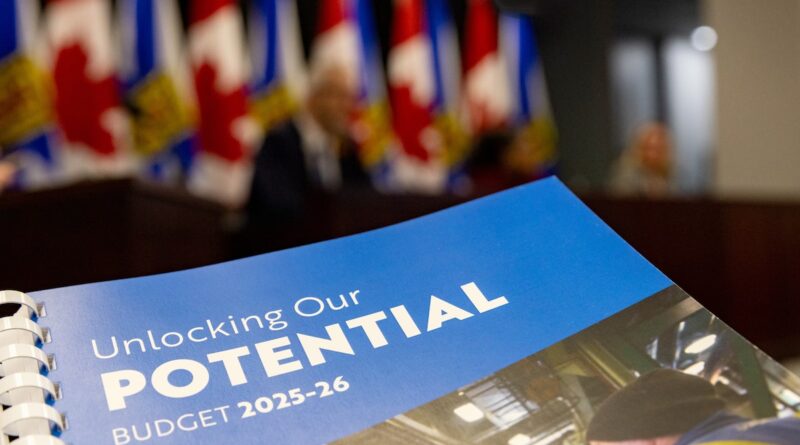Provinces scale back fiscal plans in face of potential trade war
A copy of the provincial budget is displayed as Nova Scotia Finance Minister John Lohr attends a media briefing in Halifax on Feb. 18.Kelly Clark/The Canadian Press
British Columbia and Nova Scotia each mapped out a lean fiscal year ahead, with B.C. announcing a spending review and Nova Scotia setting aside a reserve fund, as American trade uncertainty looms over provincial budget season.
The two provinces, which spoke to their near-term financial futures in separate official pronouncements on Tuesday, join other governments across the country in manoeuvring to brace themselves for the turmoil that would almost certainly follow if U.S. President Donald Trump makes good on his threat to impose across-the-board 25-per-cent tariffs on most Canadian exports next month.
In its Speech from the Throne, B.C.’s New Democratic government said it is reviewing its programs and spending as it reorients to a new trade landscape, calling the shift “the most consequential time for our province since the Second World War.”
The provincial NDP has already scrapped an election promise to deliver $1,000 rebates to households and says it will instead focus on protecting core services.
Nova Scotia’s Progressive Conservative government introduced a $17.6-billion budget that includes major tax cuts and a reserve fund to be used if the U.S. tariffs materialize.
N.S. Finance Minister John Lohr is forecasting a deficit of $697.5-million for the 2025-26 fiscal year – a figure that could rise if the $200-million reserve fund needs to be used. The budget contains $500-million in tax cuts, including a one percentage point drop in the harmonized sales tax to 14 per cent, and an increase in the basic personal amount that is shielded from the provincial income tax.
Most provinces are finalizing their budgets now. Alberta will deliver its fiscal plan on Feb. 27, and Saskatchewan will table a budget March 19.
Ontario Progressive Conservative Leader Doug Ford had previously announced some contingency plans for his province. In Ontario, whose auto and manufacturing sectors are set to be hit hard by any across-the-board tariffs, there has been no discussion of fiscal restraint, as Mr. Ford campaigns in the snap election he triggered for Feb. 27, just 2½ years after the last provincial vote. Mr. Ford said he needed a new mandate to launch a pandemic-style tariff bailout worth tens of billions of dollars.
He later released a plan that includes about a 10-per-cent increase to infrastructure spending over the next decade and $10-billion in tax deferrals for businesses, while saying any direct support for laid-off workers would come through the federal employment-insurance system. His Liberal and NDP rivals have also promised billions in tariff relief, as well as spending boosts for health care and education.
Mr. Ford’s budget projections from last fall showed a 2024-25 deficit of $6.6-billion, and no balanced books until 2026-27. But despite this, he announced a pre-election move to hand out $200 cheques to most residents, at a cost of $3-billion.
New Brunswick’s Liberal government, meanwhile, is projecting a major budget shortfall. It had anticipated a surplus for the seventh year in a row, but in its third-quarter fiscal update released last week, the province predicted a near $400-million budget deficit. The shortage is mostly owing to skyrocketing health care expenses, including operating and staffing costs at regional health authorities and contracts for travel nurses.
B.C. Premier David Eby told reporters on Tuesday that the province’s next budget will be built on forecasts for reduced revenues.
“Just the uncertainty created by tariffs has caused [forecasters] to reduce their projections for revenues,” he said. “We’re now facing a scenario where the tariffs threat will put Canada’s and British Columbia’s economy on the back foot.”
B.C. Finance Minister Brenda Bailey will bring in her fiscal plan on March 4, but has already signalled an austerity budget with a broad hiring freeze across the civil service. The budget will include measures designed to boost the economy, such as additional tax credits for the film industry.
The B.C. Legislature convened for the first time in nine months on Tuesday, and MLAs opened the session by singing O Canada – an exceptionally rare act in British Columbia’s Parliament, and a clear rebuttal to Mr. Trump’s stated desire to turn Canada into the 51st state.
The Throne Speech promised a concerted effort to reduce the province’s reliance on the U.S. for trade, both by seeking new trade opportunities abroad and by breaking down interprovincial trade barriers.
“It should not be easier to buy and sell with Washington State than with our Canadian friends and neighbours,” said the speech read by Lieutenant-Governor Wendy Cocchia. “This must change. And change it will.”
Mr. Eby told reporters that workers with certifications from one province should be able to transfer their skills to another jurisdiction, but regulatory differences often make that difficult.
“The goal would be mutual recognition of each other’s regulations,” he said. “I think we’re going to be able to find, if not all provinces, at least a coalition of the willing to get this done.”
With reports from Jeff Gray in Toronto, Lindsay Jones in Halifax and The Canadian Press

